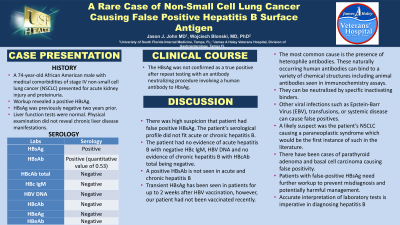Back


Poster Session C - Monday Afternoon
Category: Liver
C0575 - A Rare Case of Non-Small Cell Lung Cancer Causing False Positive Hepatitis B Surface Antigen
Monday, October 24, 2022
3:00 PM – 5:00 PM ET
Location: Crown Ballroom

Has Audio

Jason J. John, MD
University of South Florida Health
Tampa, FL
Presenting Author(s)
Jason J. John, MD1, Wojciech Blonski, MD, PhD2
1University of South Florida Health, Tampa, FL; 2James A. Haley VA Hospital, Tampa, FL
Introduction: Hepatitis B surface antigen (HBsAg) is a protein on the surface of HBV which can be a distinctive serological marker of acute or chronic hepatitis B infection. We present a case of 74-year-old male with a false positive HBsAg test.
Case Description/Methods: A 74-year-old African American male with medical comorbidities of stage IV non-small cell lung cancer (NSCLC) and HTN presented to the hospital for an acute kidney injury with proteinuria. Hepatitis B virus (HBV) panel was obtained and revealed positive HBsAg. HBsAg was previously negative two years prior. Patient had multiple risk factors for hepatitis B infection including prior use of IV cocaine and multiple sexual partners. The patient denied any recent vaccinations. Liver function tests were normal. Physical examination did not reveal chronic liver disease manifestations. HBs Antibody (HBsAb) was positive with a quantitative value of 0.53. Hepatitis B core immunoglobulin M (HBc IgM), HBcAb total, HBeAg, HBeAb were all negative with undetectable serum HBV DNA. The HBsAg was not confirmed as a true positive after repeat testing with an antibody neutralizing procedure involving a human antibody to HbsAg.
Discussion: Accurate interpretation of laboratory tests is imperative in diagnosing hepatitis B. There was high suspicion that patient had false positive HBsAg. The patient’s serological profile did not fit acute or chronic hepatitis B. The patient had no evidence of acute hepatitis B with negative HBc IgM, HBV DNA and no evidence of chronic hepatitis B with HBcAb total being negative. Furthermore, a positive HBsAb is not seen in acute and chronic hepatitis B. Transient HBsAg has been seen in patients for up to 2 weeks after HBV vaccination, however, our patient had not been vaccinated recently. The most common cause is the presence of heterophile antibodies. These naturally occurring human antibodies can bind to a variety of chemical structures including animal antibodies seen in immunochemistry assays. They can be neutralized by specific inactivating binders. Other viral infections such as Epstein-Barr Virus (EBV), transfusions, or systemic disease can cause false positives. A likely suspect was the patient’s NSCLC causing a paraneoplastic syndrome which would be the first instance of such in the literature. There have been cases of parathyroid adenoma and basal cell carcinoma causing false positivity. Patients with false-positive HBsAg need further workup to prevent misdiagnosis and potentially harmful management.
Disclosures:
Jason J. John, MD1, Wojciech Blonski, MD, PhD2. C0575 - A Rare Case of Non-Small Cell Lung Cancer Causing False Positive Hepatitis B Surface Antigen, ACG 2022 Annual Scientific Meeting Abstracts. Charlotte, NC: American College of Gastroenterology.
1University of South Florida Health, Tampa, FL; 2James A. Haley VA Hospital, Tampa, FL
Introduction: Hepatitis B surface antigen (HBsAg) is a protein on the surface of HBV which can be a distinctive serological marker of acute or chronic hepatitis B infection. We present a case of 74-year-old male with a false positive HBsAg test.
Case Description/Methods: A 74-year-old African American male with medical comorbidities of stage IV non-small cell lung cancer (NSCLC) and HTN presented to the hospital for an acute kidney injury with proteinuria. Hepatitis B virus (HBV) panel was obtained and revealed positive HBsAg. HBsAg was previously negative two years prior. Patient had multiple risk factors for hepatitis B infection including prior use of IV cocaine and multiple sexual partners. The patient denied any recent vaccinations. Liver function tests were normal. Physical examination did not reveal chronic liver disease manifestations. HBs Antibody (HBsAb) was positive with a quantitative value of 0.53. Hepatitis B core immunoglobulin M (HBc IgM), HBcAb total, HBeAg, HBeAb were all negative with undetectable serum HBV DNA. The HBsAg was not confirmed as a true positive after repeat testing with an antibody neutralizing procedure involving a human antibody to HbsAg.
Discussion: Accurate interpretation of laboratory tests is imperative in diagnosing hepatitis B. There was high suspicion that patient had false positive HBsAg. The patient’s serological profile did not fit acute or chronic hepatitis B. The patient had no evidence of acute hepatitis B with negative HBc IgM, HBV DNA and no evidence of chronic hepatitis B with HBcAb total being negative. Furthermore, a positive HBsAb is not seen in acute and chronic hepatitis B. Transient HBsAg has been seen in patients for up to 2 weeks after HBV vaccination, however, our patient had not been vaccinated recently. The most common cause is the presence of heterophile antibodies. These naturally occurring human antibodies can bind to a variety of chemical structures including animal antibodies seen in immunochemistry assays. They can be neutralized by specific inactivating binders. Other viral infections such as Epstein-Barr Virus (EBV), transfusions, or systemic disease can cause false positives. A likely suspect was the patient’s NSCLC causing a paraneoplastic syndrome which would be the first instance of such in the literature. There have been cases of parathyroid adenoma and basal cell carcinoma causing false positivity. Patients with false-positive HBsAg need further workup to prevent misdiagnosis and potentially harmful management.
Disclosures:
Jason John indicated no relevant financial relationships.
Wojciech Blonski indicated no relevant financial relationships.
Jason J. John, MD1, Wojciech Blonski, MD, PhD2. C0575 - A Rare Case of Non-Small Cell Lung Cancer Causing False Positive Hepatitis B Surface Antigen, ACG 2022 Annual Scientific Meeting Abstracts. Charlotte, NC: American College of Gastroenterology.
